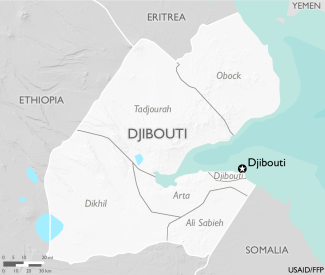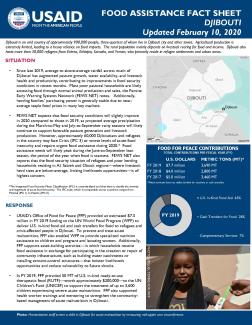February 10, 2020
Djibouti is an arid country of approximately 900,000 people, three-quarters of whom live in Djibouti city and other towns. Agricultural production is extremely limited, leading to a heavy reliance on food imports. The rural population mainly depends on livestock rearing for food and income. Djibouti also hosts more than 30,000 refugees from Eritrea, Ethiopia, Somalia, and Yemen, who primarily reside in refugee settlements and urban areas.
Situation
- USAID’s Office of Food for Peace (FFP) provided an estimated $7.5 million in FY 2019 funding to the UN World Food Program (WFP) to deliver U.S. in-kind food aid and cash transfers for food to refugees and crisis-affected people in Djibouti. To prevent and treat acute malnutrition, FFP also enabled WFP to provide specialized nutrition assistance to children and pregnant and lactating women. Additionally, FFP supports asset-building activities—in which households receive food assistance in exchange for participating in the creation or repair of community infrastructure, such as building water catchments or installing erosion-control structures—that bolster livelihoods opportunities and reduce vulnerability to future shocks.
- In FY 2019, FFP provided 50 MT of U.S. in-kind ready-to-use therapeutic food (RUTF)—worth approximately $200,000—to the UN Children’s Fund (UNICEF) to support the treatment of up to 3,600 children experiencing severe acute malnutrition. FFP also supported health worker trainings and mentoring to strengthen the community-based management of acute malnutrition in Djibouti.
Food for Peace Contributions
Total Contributions:
| U.S. Dollars | Metric Tons | |
|---|---|---|
| Fiscal Year 2019 | $7.7 million | 3,690 MT |
| Fiscal Year 2018 | $4.0 million | 2,800 MT |
| Fiscal Year 2017 | $5.0 million | 3,460 MT |
* Metric tonnage does not reflect funding for vouchers or cash transfers.
Related Resources


